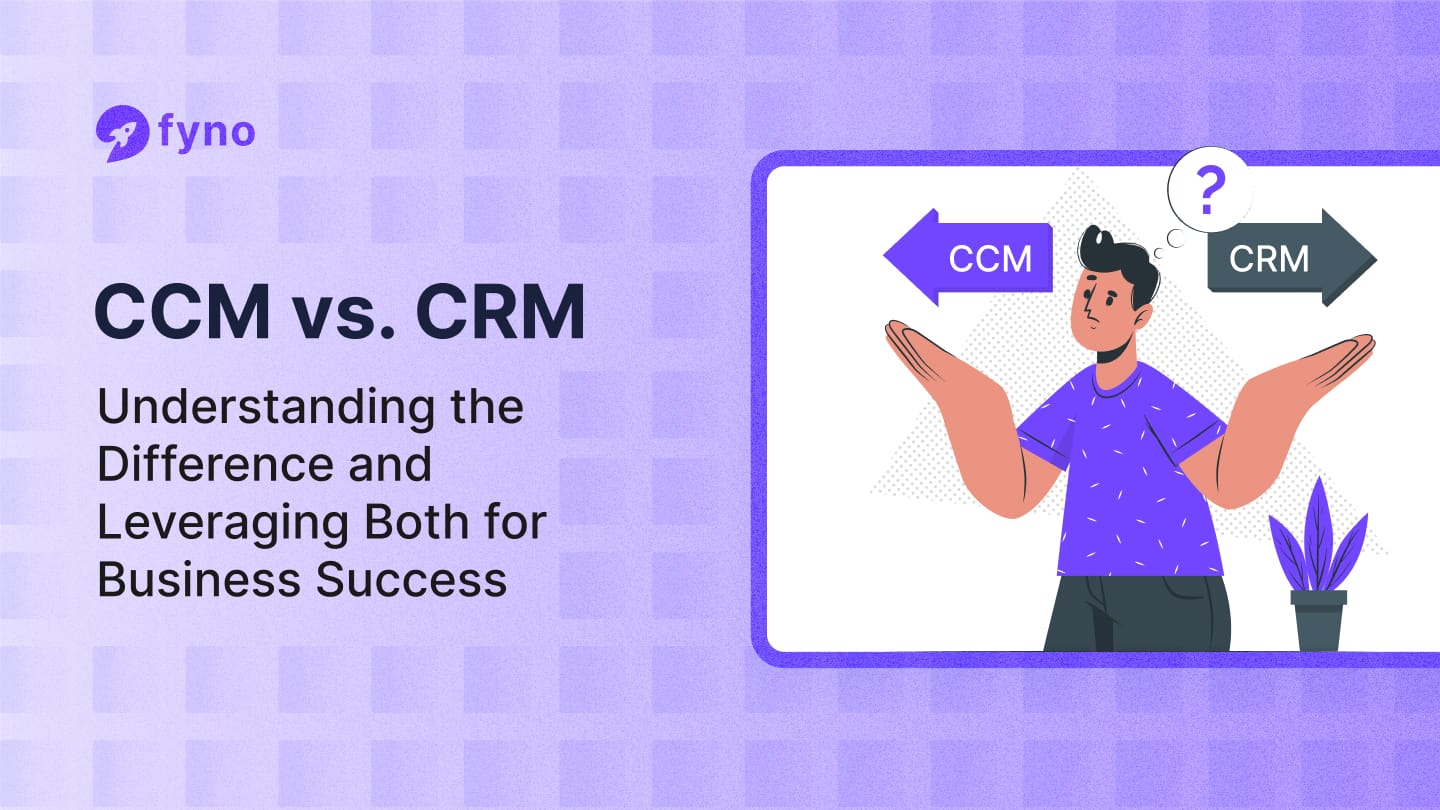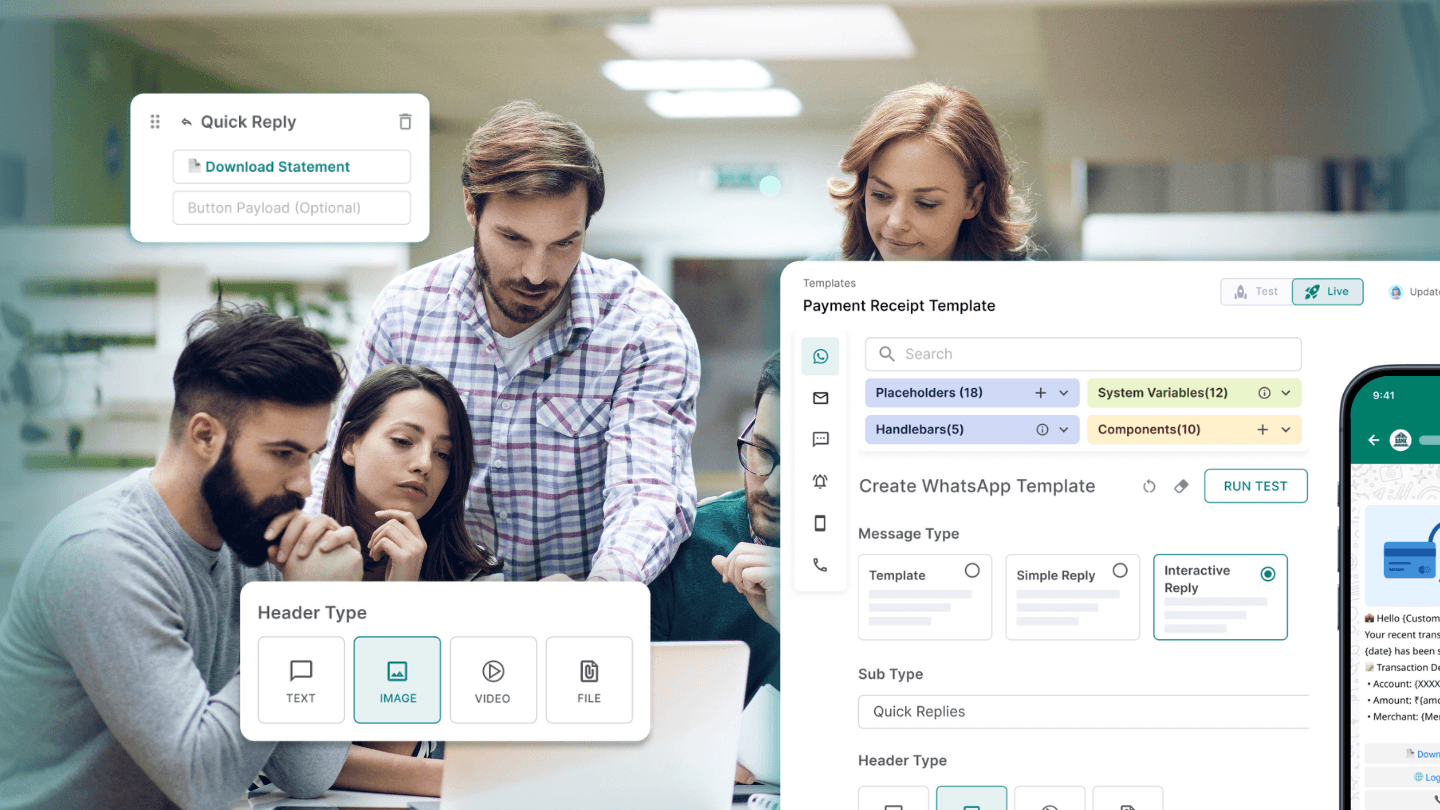Imagine you're at a party. You're having amazing conversations with dozens of guests. As you speak, you remember their names, preferences, and previous interactions to make sure that each person you speak to feels valued. Now, picture doing this with thousands, or even millions, of people simultaneously.
Welcome to the world of modern business communication.
The complex and ever-evolving ecosystem of customer relationships requires a ton of insights to make your prospects and customers feel special. And, businesses are increasingly using two major types of software platforms to achieve this feat: A Customer Relationship Management (CRM) software and a Customer Communications Management (CCM) software.
While their acronyms may be similar, their roles in your business strategy can be as different as a whisper and a megaphone.
But here's the million-dollar question: Do you need a CRM, a CCM, or both? And how do you leverage these tools to create a symphony of customer engagement rather than a cacophony of disjointed messages?
In this comprehensive guide, we'll cut through the jargon and explore the unique strengths of CRM and CCM systems. We'll uncover how they differ, where they shine, and most importantly, how they can work together to transform your customer interactions.

Introduction to CCM and CRM
Before we dive into the specifics, let's start by defining what is a CCM and a CRM software:
Customer communications management (CCM) software
CCM is a strategy focusing on creating, managing, and delivering personalized customer communications across various channels. It's all about ensuring that your messages reach the right customers, through the right channels, at the right time.
Customer relationship management (CRM) software
CRM, on the other hand, is a technology used for managing all relationships and interactions with customers and potential customers, with increased emphasis on building a sales pipeline and tracking their progress. A CRM is a great tool for founders and sales teams to understand their customers and the factors that drive their purchase decisions.
Key differences between CCM and CRM
While both CCM and CRM are crucial for managing customer interactions, they serve different primary functions within an organization. Let's break down the key differences:
CCM vs. CRM – What are the key differences?
CRM features:
- Contact management: CRM systems allow you to organize and maintain customer contact information, including names, addresses, phone numbers, and email addresses.
- Sales pipeline management: CRMs help track potential sales opportunities through various stages of the sales process, from lead generation to closing deals.
- Customer interaction history: CRM platforms record all interactions with customers, including calls, emails, and meetings, providing a comprehensive view of the customer relationship over time.
- Reporting and analytics: CRMs offer robust reporting capabilities, allowing businesses to analyze sales trends, customer behaviour, and team performance.
- Task management: Many CRM systems include features for assigning and tracking tasks related to customer interactions and sales processes.
CCM features:
- Multi-channel communication management: CCM systems enable businesses to create, manage, and deliver communications across various channels, including email, SMS, push notifications, and more.
- Template management: CCM platforms provide centralized management of communication templates for all channels, ensuring consistency across all customer touchpoints.
- Content personalization: CCM systems allow for the creation of highly personalized communications based on customer data and user preferences.
- Workflow automation: CCM tools help automate communication processes, triggering messages based on specific events or customer actions.
- Compliance management: Many CCM systems include features to ensure communications comply with industry regulations and standards.
Comparison table of CCM and CRM features
Feature | CRM | CCM |
Primary Focus | Managing customer relationships and sales processes | Managing and optimizing customer communications |
Contact Management | ✓ | ✓ (Limited) |
Sales Pipeline Tracking | ✓ | ✗ |
Multichannel Communication | ✗ | ✓ |
Template Management | ✗ | ✓ |
Personalization | Limited | Advanced |
Workflow Automation | Limited | Advanced |
Compliance Management | Limited | Advanced |
Reporting and Analytics | ✓ | ✓ |
Benefits of using a CRM
While CCM focuses on optimizing communications, CRM systems offer their own set of valuable benefits for businesses:
Enhances customer understanding
CRM systems provide a 360-degree view of customer interactions, allowing businesses to engage more effectively with their clients. By having access to a customer's complete history, including past conversations, meeting insights, and preferences, companies can tailor their approach to each individual customer. This personalized engagement leads to stronger relationships and better sales figures.
Streamlines sales processes
One of the primary benefits of CRM is its ability to streamline and optimize sales processes. CRM systems and Business Central Implementation help sales teams manage their pipelines more effectively, track leads, and identify the most promising opportunities. By automating routine tasks and providing real-time insights into sales performance, CRMs enable sales teams to focus on what they do best – closing deals and growing revenue.
Improves customer service
CRM systems play a crucial role in enhancing customer service capabilities. By providing customer service representatives with instant access to a customer's complete history and preferences, CRMs enable faster, more personalized problem resolution. This improves customer satisfaction and also increases the efficiency of support teams.
Benefits of using a CCM
While CRM systems excel at managing customer relationships and sales processes, CCM brings its own set of benefits to the table:
Personalized customer communication
CCM systems take personalization to the next level. By leveraging customer data from various sources, including CRM systems, CCM platforms can create highly tailored communications that resonate with individual customers. This level of personalization goes beyond simply addressing a customer by name – it involves creating content that's relevant to their specific needs, preferences, and behaviours.
Consistency across communication channels
In today's omnichannel world, maintaining a consistent brand voice and message across all customer touchpoints is crucial. CCM systems help ensure that every email, SMS, or in-app notification a customer receives has a consistent tone and style.
Better customer experience
By delivering the right message through the right channel at the right time, CCM systems significantly enhance the overall customer experience. They enable businesses to create seamless, personalized customer journeys that guide customers from initial interest to purchase.
Improved deliverability
CCM platforms often include various features such as throttling, failover workflows, etc. to optimize message deliverability. This is particularly important for business critical communications such as transaction alerts, delivering One-Time Passwords (OTPs), and service messages. Improving deliverability will enhance customer experience and reduce operational and financial overheads for the company.
Lower operating expenses
By optimizing communication workflows and leveraging the most cost-effective channels for each type of message, CCM systems can help businesses reduce their overall communication costs. For example, a CCM might automatically choose to send a notification via a push notification (which is free) rather than an SMS (which has a cost per message) when appropriate.
Elimination of engineering overheads
CCM systems often provide user-friendly interfaces that allow non-technical team members to create, edit, and manage communication templates and workflows. This reduces the burden on engineering teams, freeing them up to focus on core product development rather than routine communication tasks.
How does CCM complement CRM?
While CRM and CCM systems serve different functions, they can work together synergistically to offer a more comprehensive approach to customer management:
Integrating CCM with CRM for effective customer management
When integrated effectively, CCM and CRM systems can create a powerful ecosystem for managing customer relationships and communications.
The CRM system serves as the central repository for customer data, including contact information, interaction history, and sales opportunities. The CCM system then leverages this data to create and deliver highly personalized, timely, and relevant communications across various channels.
This integration allows businesses to:
- Create more targeted and effective marketing campaigns based on CRM data
- Automate personalized follow-ups and after-sales interactions, which can be recorded in the CRM
- Trigger appropriate communications based on changes in customer status or behaviour tracked in the CRM
- Provide customer service representatives with a complete view of all communications sent to customers, offering insights on which type of communication works well with the customers.
Factors to consider when choosing between CRM and CCM
When deciding between CCM and CRM, or considering implementing both, it's important to carefully evaluate your business needs and objectives. Here are some key factors to consider:
Business needs and objectives
Start by clearly defining your primary business goals. Are you looking to improve sales processes and customer relationship management? In that case, using a CRM should be your priority. Instead, if your focus is on enhancing and personalizing customer communications across multiple channels, a CCM system might be more appropriate. But several businesses use both CCM and CRM tools to fully optimize their customer management and communication strategies.
Communication volume and complexity
Consider the volume and complexity of your customer communications. If you're sending a high volume of personalized messages across multiple channels, a CCM system becomes increasingly valuable. For businesses with simpler communication needs, the basic communication features of a CRM might suffice.
Regulatory and compliance requirements
If your industry is heavily regulated (like finance or healthcare), a CCM system with robust compliance management features might be essential. These systems can help ensure that all communications adhere to relevant regulations and standards.
How can Fyno help
When it comes to customer communications management, Fyno offers a powerful, flexible solution designed to meet the needs of modern businesses.
Features and benefits of using Fyno as a CCM
- Unified communication hub: Fyno provides a centralized platform for managing all your customer communications, including email, SMS, push notifications, and more.
- Intelligent channel selection: Fyno's opti-channel approach ensures messages are sent through the most effective channel for each customer and scenario.
- Advanced personalization: Leverage customer data to create highly personalized messages that resonate with individual recipients.
- Workflow automation: Design and implement complex communication workflows that trigger based on customer actions or events.
- Template management: Centrally manage and update communication templates, ensuring consistency across all channels.
- Analytics and reporting: Gain insights into the performance of your communication strategies with comprehensive analytics and reporting tools.
- Seamless integration: Fyno easily integrates with popular CRM systems and other business tools, creating a cohesive ecosystem for customer management.
- Flexibility and scalability: Fyno's modular architecture allows businesses to start with the features they need and scale as their requirements grow.
- Early access to new features: Fyno is committed to staying at the forefront of CCM technology, regularly introducing new features and integrations to meet evolving business needs. Fyno is also a Meta-verified tech partner — means that you will get access to the latest WhatsApp features, for example, WhatsApp Flows before others.
- Dedicated support: Fyno offers comprehensive support and guidance to ensure the successful implementation and optimization of your CCM strategy.
By choosing Fyno, you're not just getting a CCM platform – you're getting a comprehensive solution that addresses the complex challenges of modern customer communication, enabling you to deliver exceptional experiences while staying compliant and avoiding operational and financial overheads.
Ready to transform your customer communications strategy? Explore how Fyno can help you achieve your goals. Contact us today for a personalized demo and discover the power of intelligent, multi-channel customer communications management.


